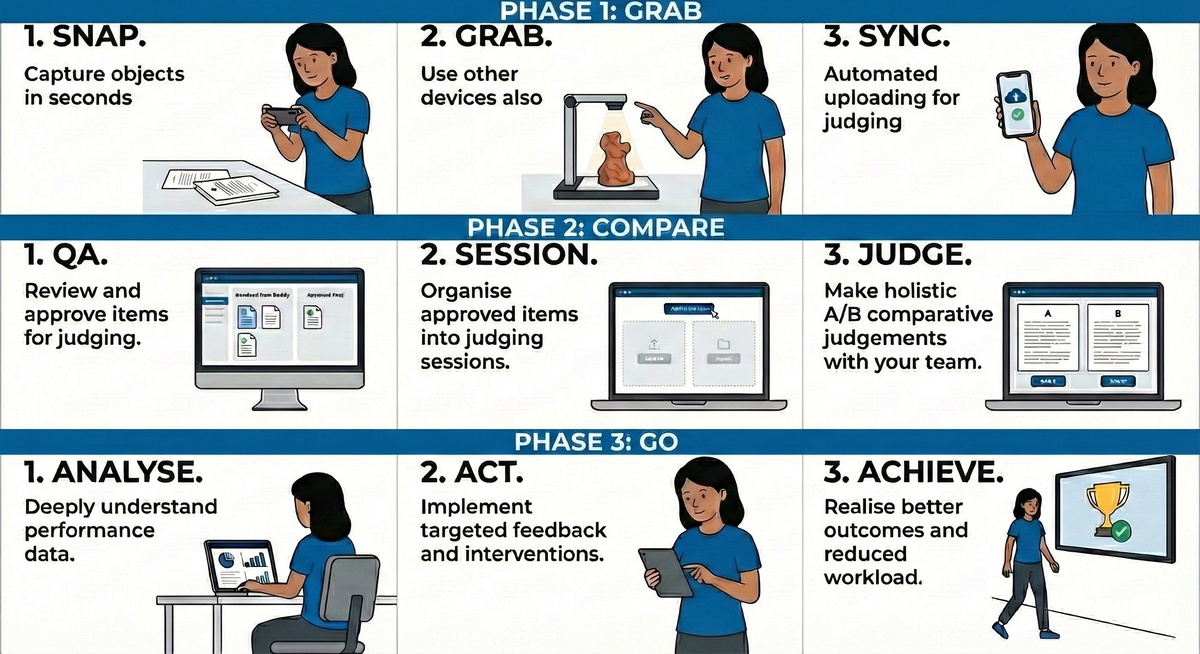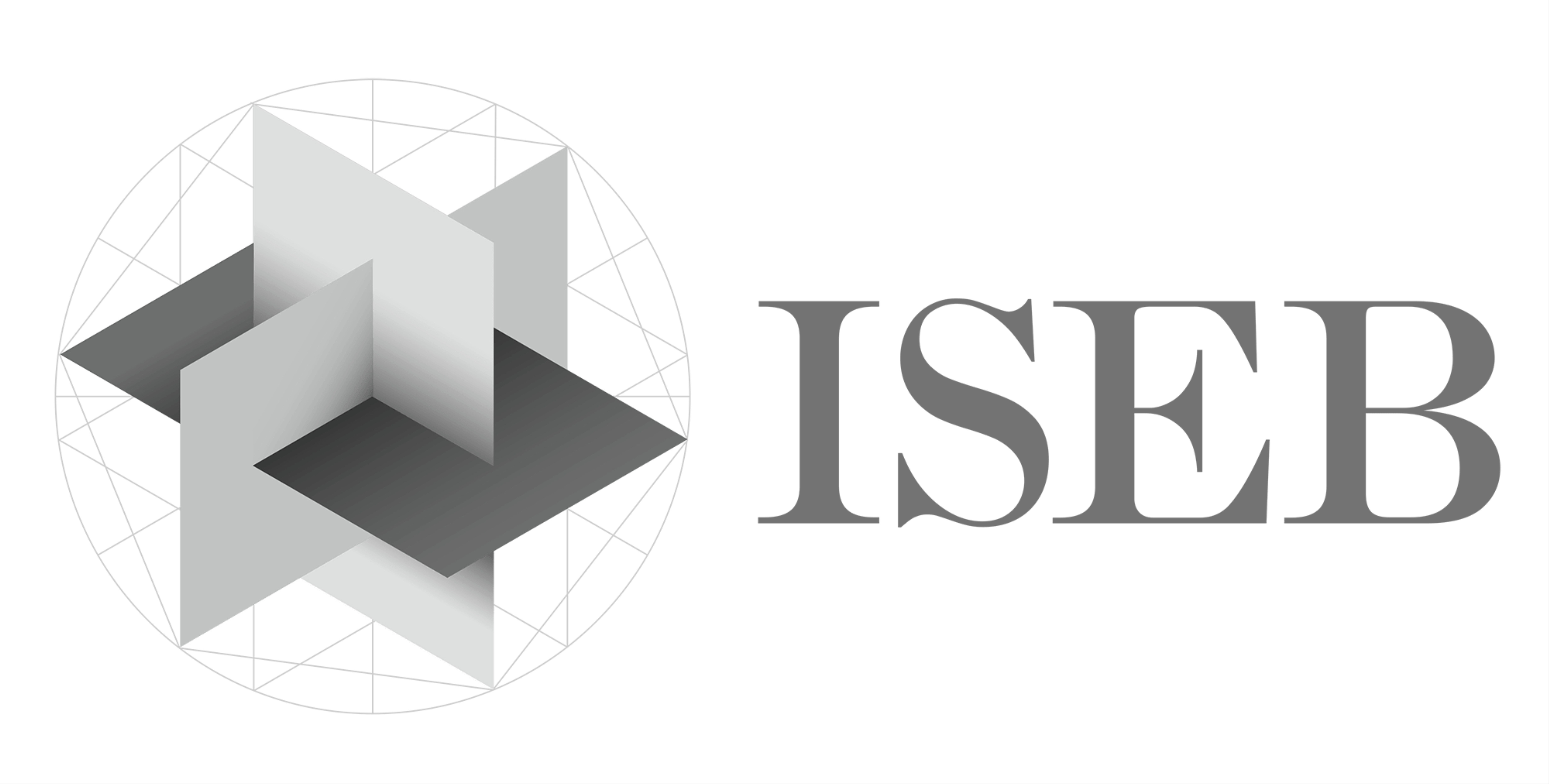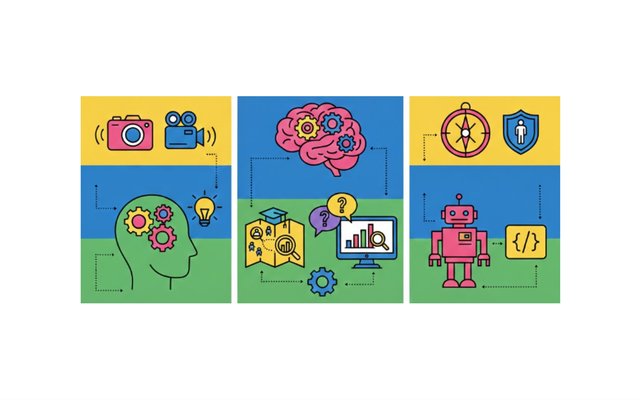Quality at Scale
Assess subjective work fairly
and fast at any scale
From 30 students to 30,000 candidates — now including instant mobile capture with our new Companion App.
Schools and School Groups
Assess Creativity & Oracy
Move beyond "tick-box" rubrics. Reliably assess holistic skills across your entire school network.
Explore Education →High-Volume Recruitment
Stop Screening, Start Ranking
CVs are broken by AI. Use ACJ to rank thousands of candidates based on authentic work samples.
Explore Hiring →Global Awarding
Defensible Standards
Solve the "Examiner Crunch." Secure grade boundaries and prevent inflation on high-stakes exams.
Explore Awarding →Higher Education
Admissions & Peer Learning
A validated way to assess applicant potential at scale, and a tool to empower student peer review.
Explore Higher Ed →Training & Compliance
Validate Internal Assessment
Standardise judgement across sites. Evidence your decisions against audit and external scrutiny.
Explore Training →New Feature
The RM Compare Companion App
Bridge the gap between the physical and digital. Capture work, portfolios, and performances directly from your mobile device and sync them instantly to your assessment session.
- Mobile-First: Designed for speed in the classroom or office.
- Instant Sync: No more cables or manual uploads. Learn More

Modern Infrastructure
Built for the agile Enterprise
Zero-Friction Scaling
Launch a new assessment cycle in minutes. Our multi-tenant architecture handles demand spikes instantly.
Config over Customisation
Toggle features, adjust workflows, and manage permissions via our admin console. You own your roadmap.
Secure & Compliant
Enterprise-grade security, ISO 27001 certified and GDPR compliant. Millions of judgements processed annually.
The Science of Comparative Judgement
Why "Better/Worse" beats "7 out of 10"
Humans are notoriously bad at absolute judgement. We are highly accurate at Relative Judgement.
1
Capture & Upload
Use the new Companion App to capture physical work instantly, or upload any file type (portfolios, essays, video).
2
Compare Pairs
Judges see two items side-by-side and simply decide: "Which is better?"
3
Get Validated Data
Our algorithm generates a highly reliable rank order (0.9+ reliability) and actionable data.
Trusted by world-leading organizations





See the Platform in Action
Assessment in the Age of AI
RM Compare 1 minute explainer
Brilliantly simple. Awesome power.
Backed by science and deep research
Professor Scott Bartholomew explains why ACJ is so powerful.
RM Compare is developing fast
Stay up to date with the very latest information
-

Beyond GDPR: Using the UK AI Product Safety Standards to Judge Your Assessment Tools
In this series, we’ve been arguing that sovereignty is the only sustainable path for professional judgment in an agentic world. We started by looking at the infrastructure we’ll need for sovereign intelligence, then at the difference between sovereign systems and AI wrappers, and most recently at dark patterns that steer people into feeding someone else’s models.
-

The Sovereign Exit: Why Portability is the Ultimate Trust Test
In our series on digital sovereignty, we have explored how "Harvesting Models" use dark patterns to bypass consent and how "AI Wrappers" quietly extract value from your institutional judgment data. But there is one final, definitive test of a vendor’s intent: What happens when you want to leave?
-

Dark Patterns in AI Assessment: When “Consent” Steals Your Sovereignty
In earlier posts we argued that sovereignty is the only sustainable path for professional judgment, and that organisations need infrastructure which lets them own and operate their own intelligence. There’s another layer to this: even if the architecture is centralised, the interface can quietly decide who wins. The way AI is presented in a product can make the difference between a conscious choice and a gentle shove.
